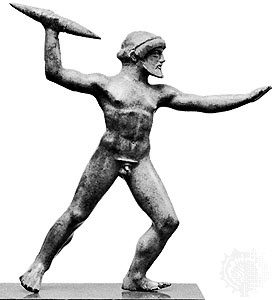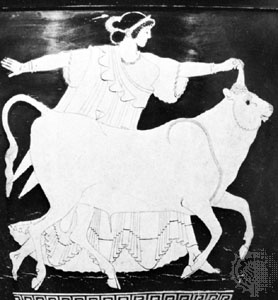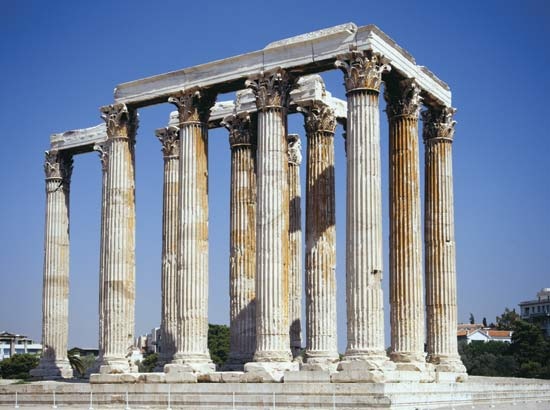Zeus
Greek god
 in ancient Greek religion, chief deity of the pantheon, a sky and weather god who was identical with the Roman god Jupiter. His name clearly comes from that of the sky god Dyaus of the ancient Hindu Rigveda. Zeus was regarded as the sender of thunder and lightning, rain, and winds, and his traditional weapon was the thunderbolt. He was called the father (i.e., the ruler and protector) of both gods and men.
in ancient Greek religion, chief deity of the pantheon, a sky and weather god who was identical with the Roman god Jupiter. His name clearly comes from that of the sky god Dyaus of the ancient Hindu Rigveda. Zeus was regarded as the sender of thunder and lightning, rain, and winds, and his traditional weapon was the thunderbolt. He was called the father (i.e., the ruler and protector) of both gods and men.According to a Cretan myth that was later adopted by the Greeks, Cronus, king of the Titans, upon learning that one of his children was fated to dethrone him, swallowed his children as soon as they were born. But Rhea, his wife, saved the infant Zeus by substituting a stone wrapped in swaddling clothes for Cronus to swallow and hiding Zeus in a cave on Crete. There he was nursed by the nymph (or female goat) Amalthaea and guarded by the Curetes (young warriors), who clashed their weapons to disguise the baby's cries. After Zeus grew to manhood he led a revolt against the Titans and succeeded in dethroning Cronus, perhaps with the assistance of his brothers Hades and Poseidon, with whom he then divided dominion over the world.
As ruler of heaven Zeus led the gods to victory against the Giants (offspring of Gaea and Tartarus) and successfully crushed several revolts against him by his fellow gods. According to the Greek poet Homer, heaven was located on the summit of Olympus (Olympus, Mount), the highest mountain in Greece and the logical home for a weather god. The other members of the pantheon resided there with Zeus and were subject to his will. From his exalted position atop Mount Olympus Zeus was thought to omnisciently observe the affairs of men, seeing everything, governing all, and rewarding good conduct and punishing evil. Besides dispensing justice—he had a strong connection with his daughter Dike (Justice)—Zeus was the protector of cities, the home, property, strangers, guests, and supplicants.
 Zeus was well known for his amorousness—a source of perpetual discord with his wife, Hera—and he had many love affairs with both mortal and immortal women. In order to achieve his amorous designs, Zeus frequently assumed animal forms, such as that of a cuckoo when he ravished Hera, a swan when he ravished Leda, or a bull when he carried off Europa. Notable among his offspring were the twins Apollo and Artemis, by the Titaness Leto; Helen and the Dioscuri, by Leda of Sparta; Persephone, by the goddess Demeter; Athena, born from his head after he had swallowed the Titaness Metis; Hephaestus, Hebe, Ares, and Eileithyia, by his wife, Hera; Dionysus, by the goddess Semele; and many others.
Zeus was well known for his amorousness—a source of perpetual discord with his wife, Hera—and he had many love affairs with both mortal and immortal women. In order to achieve his amorous designs, Zeus frequently assumed animal forms, such as that of a cuckoo when he ravished Hera, a swan when he ravished Leda, or a bull when he carried off Europa. Notable among his offspring were the twins Apollo and Artemis, by the Titaness Leto; Helen and the Dioscuri, by Leda of Sparta; Persephone, by the goddess Demeter; Athena, born from his head after he had swallowed the Titaness Metis; Hephaestus, Hebe, Ares, and Eileithyia, by his wife, Hera; Dionysus, by the goddess Semele; and many others. Though regarded by Greek religionists everywhere as omnipotent and the head of the pantheon, Zeus's very universality tended to reduce his importance compared to that of powerful local divinities like Athena and Hera. Although statues of Zeus Herkeios (Guardian of the House) and altars of Zeus Xenios (Hospitable) graced the forecourts of houses, and though his mountaintop shrines were visited by pilgrims, Zeus did not have a temple at Athens until the late 6th century BC, and even his temple at Olympia postdated that of Hera.
Though regarded by Greek religionists everywhere as omnipotent and the head of the pantheon, Zeus's very universality tended to reduce his importance compared to that of powerful local divinities like Athena and Hera. Although statues of Zeus Herkeios (Guardian of the House) and altars of Zeus Xenios (Hospitable) graced the forecourts of houses, and though his mountaintop shrines were visited by pilgrims, Zeus did not have a temple at Athens until the late 6th century BC, and even his temple at Olympia postdated that of Hera.In art Zeus was represented as a bearded, dignified, and mature man of stalwart build; his most prominent symbols were the thunderbolt and the eagle.
- Castro, Fidel
- Castro, Inês de
- Castro, João de
- Castrop-Rauxel
- Castro, Raúl
- Castro, Rosalía de
- Castro y Bellvís, Guillén de
- Castruccio Castracani
- Castrén, Matthias Alexander
- Shimomura Kanzan
- Shimomura, Osamu
- Shimonoseki
- Shimonoseki, Treaty of
- Shimon Peres
- Shin
- Shinano River
- Shinbutsu shūgō
- shinden-zukuri
- shiner
- Shingaku
- Shingei
- shingle
- Shingle style
- Shingon
- Shing-Tung Yau